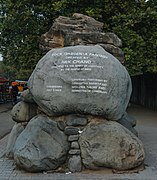Rock Garden Of Chandigarh
Description
The Rock Garden sits near Sukhna Lake. It consists of man-made interlinked waterfalls and many other sculptures that have been made of scrap and other kinds of waste (bottles, glasses, bangles, tiles, ceramic pots, sinks, electrical waste, broken pipes, etc.) which are placed in walled paths.

In his spare time, Nek Chand started collecting materials from demolition sites around the city. He recycled these materials into his own vision of the divine kingdom of Sukrani, choosing a gorge in a forest near Sukhna Lake for his work. The gorge had been designated as a land conservancy, a forest buffer established in 1902 that nothing could be built on. Chand's work was illegal, but he was able to hide it for 18 years before it was discovered by the authorities in 1976. By this time, it had grown into a 12-acre (4.9 ha) complex of interlinked courtyards, each filled with hundreds of pottery-covered concrete sculptures of dancers, musicians, and animals.
When Chand left the country on a lecture tour in 1990, the city withdrew its funding, and vandals attacked the park. The Rock Garden Society took over the administration and upkeep of this unique visionary environment.
The garden is visited by 3,000-4,000 people daily.
The Rock Garden of Chandigarh: History, Motivations, and Cultural Significance
History and Motivations
The Rock Garden of Chandigarh, created by Nek Chand Saini, is a remarkable showcase of individual creativity and resourcefulness. Saini, a public works inspector, began this project clandestinely in 1957. During a period of rapid modernization in post-independence India, he collected discarded materials from demolition sites, turning waste into art. The garden initially started in a 5-acre forested area and was later expanded.
Construction and Statistics
Construction of the Rock Garden commenced in 1957 and continued secretly for nearly two decades before being discovered by authorities in 1975. At the time of its discovery, the garden had expanded to 12 acres. Recognizing its cultural and artistic value, local authorities decided to support and fund its continuation. Although exact details of the initial costs and labor are sparse, it is known that Saini worked almost alone in the beginning. Today, the Rock Garden spans 40 acres and features over 2,000 sculptures crafted from recycled materials like broken ceramics, glass bangles, neon tubes, and industrial debris.
Major Transformations and Cultural Significance
Since its official recognition, the Rock Garden has undergone significant transformations. It was opened to the public and expanded with new sections, including open-air theaters, pavilions, and artificial waterfalls. These additions have enriched the visitor experience and established the garden as a major cultural and tourist landmark.
The Rock Garden is acclaimed for its pioneering role in the environmental art and recycling movement. It demonstrates how art can transform urban spaces and engage communities. Saini's vision and creativity have created a space that not only offers aesthetic pleasure but also promotes sustainability and resource reuse.
Current State of Conservation and Challenges
Maintained by the Nek Chand Foundation and local authorities, the Rock Garden faces challenges such as natural wear and tear of the recycled materials and the harsh climate of Chandigarh, which accelerates the deterioration of the artworks. The large number of visitors also necessitates protective measures to prevent damage.
Dolls Museum
There is also a Dolls Museum inside Rock Garden. It was inaugurated by UT Administrator V.P. Singh Badnore to mark the second death anniversary of its founder Nek Chand. The museum comprises 200 rag dolls made from waste cloth. The dolls were made by Nek Chand in the 1970s.
Gallery
-
Entrance
-
Dedication day memorial, 7 July 1988.
-
Rock Garden,Chandigarh,India
-
Dancing girls at Rock Garden, Chandigarh.
-
Decorated wall at Rock Garden.

See also
Further reading
- Nek Chand's outsider art: the rock garden of Chandigarh, by Lucienne Peiry, John Maizels, Philippe Lespinasse, Nek Chand. Published by Flammarion, 2006. ISBN 2-08-030518-2.
- The Collection, the Ruin and the Theatre: Architecture, sculpture and landscape in Nek Chand's Rock Garden, by Soumyen Bandyopadhyay and Iain Jackson. Liverpool University Press, 2007. ISBN 1-84631-120-9.
- Sublime Spaces and Visionary Worlds: Built Environments of Vernacular Artists, by Leslie Umberger (author), Erika Doss (contributor), Ruth Kohler (contributor), Lisa Stone (contributor).
References
- ^ id=3CdgUwZBNwIC&pg=PA321&dq=Rock+Garden,+Chandigarh&as_brr=0#PPA319,M1 Nek Chand Rock Garden Sublime Spaces and Visionary Worlds: Built Environments of Vernacular Artists, by Leslie Umberger, Erika Lee Doss, Ruth DeYoung Kohler II, Lisa Stone. Published by Princeton Architectural Press, 2007. ISBN 1-56898-728-5. Page 319-Page 322.
- ^ "Night tourism to light up 'rocks'". The Times of India. 1 July 2012. Archived from the original on 26 January 2013. Retrieved 30 October 2012.
- ^ "Working wealth out of waste". The Hindu.
- ^ Bhatnagar, V. S. (1996). Chandigarh, the City Beautiful: Environmental Profile of a Modern Indian City. ISBN 9788170247906.
- ^ Shakur, Tasleem; d'Souza, Karen (2003). Picturing South Asian Culture in English: Textual and Visual Representations. ISBN 9780954446307.
- ^ Sajnani, Manohar (2001). Encyclopaedia of Tourism Resources in India, Volume 1. ISBN 9788178350172.
- ^ "The Rock Garden, Chandigarh, India," PBS Independent Lens, Off the Map
- ^ Upadhyay, Ramkrishan (17 December 2017). "Rock Garden witnesses record footfall". The Tribune. Retrieved 4 November 2024.
- ^ "Nek Chand Foundation". Retrieved 29 June 2024.
- ^ Chopra, P (2012). Chandigarh and Nek Chand: The Creation of a Cultural Landscape.
- ^ "Rock Garden of Chandigarh: Doll museum opens in memory of Nek Chand | Chandigarh News - Times of India". The Times of India.
External links
- Nekchand Foundation website Archived 15 June 2011 at the Wayback Machine
- Rock Garden




